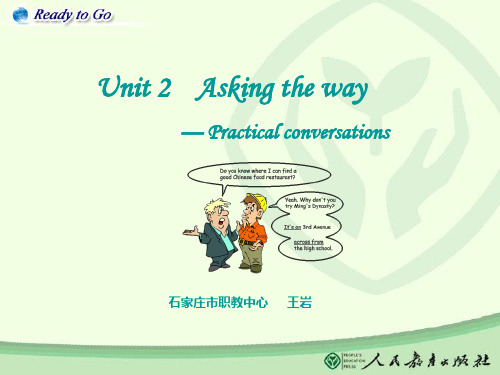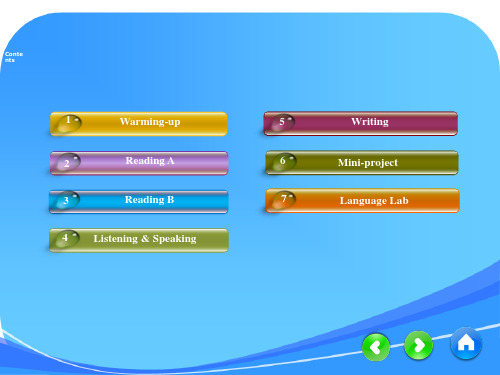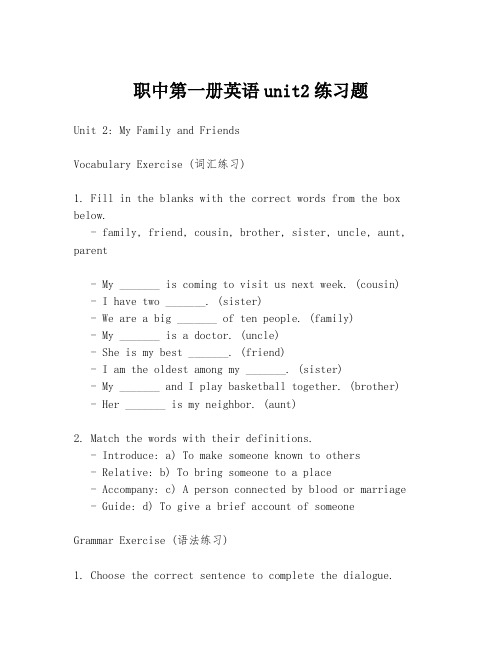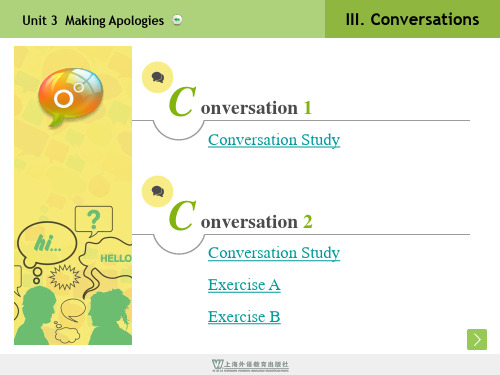新世纪中职英语第二版第一册 Unit 2 Conversations
人教版中职英语第一册unit2 Asking the way(Practical conversations)

Jin Ning is on the left. Li is on the right. Wu is not next to Li. Tian is between Jin and Wu.
A
B
C
Wu
D
Jin
E
Li
Jin is not on the left.
Jin Ning Tian
Unit 2 Asking the way — Practical conversations
A: Excuse me. I’m looking for the post office. B: The post office? It’s on Main Street. A: It’s next to the bank. B: Thanks. A: You’re welcome.
Unit 2 Asking the way — Practical conversations
at the corner of / next to / across from/between… and … take / transfer to / get off
Foot or car walk to / go down / turn to
Unit 2 Asking the way — Practical conversations
Model 1 Model 2 Model 3 Practicing time Check time Homework
5. How can I get to the Ping’an Park? Can you show me the way?
Excuse me, …
Well, …
Unit 2 Asking the way — Practical conversations
外研社新职业英语第二版职业综合英语1Unit2课件

问卷调查2,000 managers to find out their pet peeves最不能 容忍的事 about office workers办公室员工. They listed列入 tapping on the desk to be one of the top 10前10名 most annoying office habits. In fact, any kind of tapping任何一种 敲打 breaks concentration分散注意力. But for the people doing the tapping喜欢敲打的人, how can they kick the habit 改掉这个习惯? They may not even be aware 没有意识到 they’re doing it. So, perhaps we should have some sympathy理解? Jennifer: Yes, but one thing I don’t have sympathy with理 解 is talking in jargon讲行话.
How to make a good impression on your business partner How to dress appropriately on business occasions How to deal with foreigners and establish successful business relationship
职高教材第一册Unit2 Section C阅读部分unit 2 Time readingPPTX 优秀课件

B. 明亮的
Scanning Part 2 para 5-6 速读找细节点
sun
Read and decide.
1.It takes the earth one year to finish each travel around the
sun.
(T )
2. The earth's turning on its axis makes a day and a night.
axis tilt
orbit It takes the earth 24 hours to finish each_r_o_ta_t_io_n__. 地球自转一圈需要24小时。
sunshine
heat 热量
angle 角度
完成句子:将sunshine, heat,angle填入以下空格 That makes thes_u_n_s_h_in_e get to the earth from different angles. Different _a_n_g_l_es_bring different _h_e_a_t _ to the earth.
Para2. fall para.3 winter
Part 1
para.4spring
para5. What makes four seasons change? Part 2
para.6 reason
Homework
1.. copy new words and sentences of notes on
seasons change.
Look and match 匹配段落与图示
Para.1
Para.3
Para. 5
Para.2
《新世纪中职英语》第一册说课稿Unit2Thanking People (外教版)

《Thanking People》说课稿教材分析上外中职英语,充分考虑到了职校生英语基础茶的特点,在本教材中把词汇,听力,阅读理解等内容和练习有机地结合起来,把英语教学中的听,说,读,写,贯穿到每个单元每个部分之中,比较能够吸引学生的注意力,也能有效阻止教师上课满堂灌情况的发生,比较适合中职学生学习. 学情分析我们职校学生都是些精力充沛,做事马虎,缺少责任心的孩子,英语基础差,贪玩,不爱学习.针对以上的班级特点,我从学习作为突破口抓起,在英语教学上花的工夫多了,使他们精力得到释放,而且这也是老师,同学和家长的根本愿望,也一定能够得到大多数家长的大力支持和配合.这也算是对老师辛勤工作以及学生努力学习的一点回报吧.执教课题Thanking People本节课特色与创新之处(包括教学理念,教学方法,教学内容,教学手段等)激发学生学习兴趣,培养信心,教育心理学告诉我们只有学生感兴趣的东西,学生才会积极开动脑筋认真思考,并以最简捷,最有效的方法获得最必要的知识,这就是求知欲,可以说,没有兴趣就没有求知欲.当学生初学英语时,兴趣都很浓厚,但随着学习难度所增加,到了职高阶段,出现了语法不懂,单词记不住,甚至有些学生连音标都不会,逐渐失去了学习英语的信心,产生了畏难情绪,甚至产生了放弃英语的想法.在这个关键时刻,我首先鼓舞士气,从最基本的音标开始教学,而且在引导学生读,记单词时,就教给拼读规则,对于有点进步的学生在课堂上予以表扬,鼓励.同时,继续采用新奇而具有"刺激"的教学手段,如挂图配合录音,幻灯简笔画,问答竞赛等等,以帮助学生维持兴趣.树立学习信心是教学活动的心理准备工作,要变信心为行动则需要有追求的目标.心理学告诉我们人们的追求目标愈高则行动的内驱力愈大.但是面对心理素质还不稳定的职高学生,如果教师所提的目标过高,使学生可望而不可及,那么所定目标也就成了空谈.所以,我是先由学生自己提出切合实际的长远目标,然后,在分析个体情况的基础上为每个学生修订目标,提出更加具体的近期,中期目标.在教学过程中,适时地运用目标激励的作用,调动学生学习积极性,对于每达到一个小目标时,就给以肯定予以精神鼓励,培养他们学习英语的自信心.本节课与学生所学专业实际的结合程度我们的学生在教学过程中,经常会思想开小差,也就是平时所说的注意力不集中.所以如何抓住他们的学习注意力是非常关键的问题.需要我们在教学过程中参差一些学生感兴趣的话题,来吸引他们的注意力,能使他们的学习注意力,牢牢的紧扣在我们的教学过程之中.我个人认为,即使是开一些玩笑或者是说一些电视,新闻的内容,和课题无关也没关系,只要教师掌握分寸,放得开,收得回来就可以.关键是让学生能听你的就可以.当然,我们教师随机应变的能力要强,要把握好分寸课堂教学设计:《Thanking People》Listening:Words and expressions:1.pick up 开车接eg. I will pick you up at 4 o'clock near the Century Park.2.bring v. 带上,带来bring sth. heretake sth. there3. It's very/so kind of you…你……太好了.It's very kind of you to do that.你帮我忙,真是太好了.It's very kind of you to help me.4. No worries. 没问题You are welcome.It's my pleasure.Look at the pictures and fill in the blanks.Li Min is studying in _____.John Pace is Li Min's ______.Prof. Pace and Li Min will ____ together.Min ____ Prof. Pace for his time.Li Min is studying in ___________.John Pace is Li Min's ________.Prof. Pace and Li Min will ______________ together.Li Min ________ Prof. Pace for his time.Listen to the conversation again. Then complete the sentences.1.The conversation takes place between _________________ and ____________.2.Prof. Pace invites Li Min to ____________ with him.3.Li Min may take _____________ with her.4.Li Min should go to _______________ to meet Prof. Pace in the afternoon.II. SpeakingWords and expressions:invite v. 邀请邀请你喝咖啡invite you to have coffee邀请你参加一个聚会invite you to a partyshow sb. around 带某人四处看看带他们到我们学校四处看看show them around our schoolThank you for … 谢谢你……谢谢你的帮助.Thank you for your help.谢谢你帮助他.Thank you for helping him.Role-play the conversation with your partnerLi Min: I'm afraid I must get going. __________ very much for the delicious dinner. Margaret: _______________. Come again some other day.Li Min: I will. ____________________.Margaret: Don't forget. We will go to a Chinese restaurant and celebrate your birthday. Li Min: Oh, _________________. It' so ____________________________.III. ReadingWords and expressions:grateful adj. 感激的I'm so grateful.She is grateful for your help.She is grateful that you helped her.1.Erica is Prof. Pace and Margaret's daughter.2.Margaret is Prof. Pace's wife. She is also Erica's mother.3.Li Min is Prof. Pace's student.4.John Pace is Li Min's professor, Margaret's husband and Erica's father.。
职中第一册英语unit2练习题

职中第一册英语unit2练习题Unit 2: My Family and FriendsVocabulary Exercise (词汇练习)1. Fill in the blanks with the correct words from the box below.- family, friend, cousin, brother, sister, uncle, aunt, parent- My _______ is coming to visit us next week. (cousin) - I have two _______. (sister)- We are a big _______ of ten people. (family)- My _______ is a doctor. (uncle)- She is my best _______. (friend)- I am the oldest among my _______. (sister)- My _______ and I play basketball together. (brother) - Her _______ is my neighbor. (aunt)2. Match the words with their definitions.- Introduce: a) To make someone known to others- Relative: b) To bring someone to a place- Accompany: c) A person connected by blood or marriage - Guide: d) To give a brief account of someoneGrammar Exercise (语法练习)1. Choose the correct sentence to complete the dialogue.- A: Who is that girl over there?- B: Oh, that's my cousin. I _______ her to the party.- a) introduced- b) am introducing- c) was introducing- d) have introduced2. Rewrite the sentences in the past tense.- My sister is a teacher.- I have three cousins.- They live in the same city.Reading Comprehension (阅读理解)Read the passage below and answer the questions.My name is Li Ming, and I have a wonderful family. I livewith my parents and my younger brother. My father is a doctor, and my mother is a teacher. I also have an uncle who is a famous artist. He lives in another city, but we visit him often. I have a close friend named Wang Fei, who is very supportive and funny. We have been friends since primary school.1. Who does Li Ming live with?2. What is Li Ming's father's occupation?3. How often does Li Ming visit his uncle?Writing Exercise (写作练习)Write a short paragraph about your family or a close friend.Include details about their occupations, hobbies, and why they are important to you.Listening Exercise (听力练习)Listen to the dialogue between two friends discussing their families and answer the questions that follow.1. How many siblings does the first speaker have?2. What is the second speaker's favorite activity with their family?Speaking Exercise (口语练习)Prepare a short speech about your family or a close friend. Describe their personalities, what you like about them, and any memorable experiences you've shared.Please note that this is a sample exercise set for a hypothetical Unit 2 in a vocational English textbook. The exercises are designed to cover various language skills including vocabulary, grammar, reading, writing, listening, and speaking.。
新世纪中职英语第二版第一册 Unit 3 Conversations

Unit 3 Making Apologies Words and Expressions
Conversation 1
terribly ad. 非常,极其 terribly是副词,它的形容词形式是terrible(糟糕的)。要特 别注意的是,terribly是表示程度的副词,相当于very。 I’m terribly sorry for what I have done. = I’m very sorry for what I have done. 我对我所做的表示非常/万分抱歉。
Conversation 1
relax v. 放松
Unit 3 Making Apologies Words and Expressions
Conversation 1
I’d like to apologize for … 我想为„„道歉。 I’d like to … / I would like to … 后面加动词或动词词组,表示 “想„„,意欲„„”。 I’d like to have a drink. 我想喝一杯。 I’d like to see a film. 我想看电影。
Unit 3 Making Apologies
III. Conversations
C onversation 1
Conversation Study
C onversation 2
Conversation Study Exercise A Exercise B
Unit 3 Making Apologies
Unit 3 Making Apologies Words and Expressions
Conversation 1
receive v. 接到
中职英语省编教材第一册Unit 2

BOOK 1 Unit2 School and daily life学校和日常生活Lesson 1 What do you usually do at school?L earning objectivesBy the end of this lesson, the students will be able to:1.repeat and spell the new words correctly2.read the new words in the sentences fluently3. talk about your school life in your own words..Important and difficult point:Talk about your school life in your own wordsteaching methods:Reading and communicative language teaching methods Group discussions /panel discussionsTeaching procedures:Step 1:words to learntake / t ei k / 学习,上课~classes , ~notes(记笔记)surf the Net /s e:f/ 上网chat / / 聊天~with sb. have a chatfavorite /’fe 最喜爱的boring 令人厌烦的spare 空闲的 in one’s spare timesubject 学科,课程 my favorite ~PE (physical education) 体育soccer /`s / 英式足球pop music流行音乐part-time job兼职工作反义词full-time job 全职工作Step 2: task 1 Listen and repeattask 2 matchA B1.take a.课程2. favorite b. 上网3.subject c.体育4.surf the Net d. 上课5.PE e. 最喜爱的6.boring f . 兼职工作7.spare g. 流行音乐8. soccer h. 空闲的9. pop music I. 令人厌烦的10.part –time job j. (英式)足球Step 3.learning the sentence patternsWhat do you usually do at school? I take classes.What do you usually do in class? I take notes.What do you usually do after class? We surf the Net.Task 3: listen and fill in the blanksDialogue 1.A.: What do you usually do at school?B: We _______classes, play _______, sing and do other sports.A: What do you usually do in class?B: We listen to the teacher, and discuss question.Dialogue2A: What do you usually do after class?B: I do my homework , listen to ______music, do some sports and sometimes ______________.Task 4: Answer the questionsWhat do you do at school? ---------What do you do after school? --------What do you do in class? -----Step 4:summary :1.learn some new words2.learn some sentence patterns3.do some exercise to practice the words and sentence patternsStep5:exercise :1. choose the proper pictures(1) soccera b c(2) sporta b c读书真辛苦啊!(3)musica b c(4) boringa b c(5) subjecta b c2.MatchSurf the Net A. 流行音乐Pop music B. 体育Part-time job C. 业余时间P.E. D, 上网Spare time E. 兼职3. Fill in the blanks(1) –What did you do yesterday?--I had a c ______with my friends online.(2) –Who is your f________ teacher ?---I like my English teacher best.(3) ---What do you usually do in your s______ time ?--- I usually play basketball in my free time.(4) Nancy is looking for a p _____-____job.(5) ---What subjects do you t_____?---We study Chinese, English, math, computer and so on.Step6: Homework1,write the new words and grasp them.2.pre-view lesson two。
新版世纪英语第一册第2单元教师用书

Hobbies and InterestsI. IntroductionThis is the second unit of Book One. In the Listening and the Speaking section, the students will learn some useful words and phrases about hobbies and interests and learn how to express their likes and dislikes. They will be given three short dialogues as models to start conversations about hobbies or interests. Students can follow the examples and practice their oral English. In the Read and Write section, they are going to learn how to write Letter of Apology and Letter of Complaint in English. In the Skills Development section, they will learn Word Formation which deals with some useful suffixes such as “-en”, “-ish”, “-ous”and “-y”. In the Read and Finish section, there are two reading passages for students to develop their reading ability.II. ObjectivesAfter learning this unit, the students should be able to1. put into practical use some useful expressions about hobbies and interests;2. understand the text and grasp the main idea;3. master the important words, expressions and sentence structures in the text and can do relevantexercises of the text independently;4. learn to write Letter of Apology and Letter of Complaint in English.5. learn to use the suffixes of the English words in the Word Formation section.III. Background InformationHobby--- a leisure-time interest or activity taken up primarily for pleasure. A hobby may involve the development of intricate knowledge of /or capability in a special field. When people are asked why they take up a hobby, they will give different reasons. Some feel that they should do something useful in their spare time. Some talk about self-improvement. Some think that they should learn something new. The most popular answer of all is that a hobby provides an opportunity to do something absolutely different from one’s usual work. But the most convincing reply is that the person simply does it for pleasure. There may be hundreds, or even thousands of different kinds of hobbies. There are indoor hobbies and outdoor hobbies. Sports are one of the popular forms of recreation. Swimming, surfing, sailing, diving are also very popular. Some people like gardening. Indoor hobbies are even more varied. Home games, such as playing cards, chess, and checkers, and today, computer games can give you fun. Women like to do cooking or dress-making. The most common hobby is collecting, i.e. finding as many things of one kind as possible. Some people collect antiques. Others collect stamps or coins, bottles or bottle caps, stuffed animals, postcards, badges, match boxes, in fact, anything that might be interesting to collect.Nowadays, another hobby which is more and more popular is “do-it-yourself” (DIY). People like to buy ready-made parts and bring them home and do it themselves. This may prove challenging sometimes. No matter what your hobby may be, it gives you pleasure in your spare time.IV. Class PresentationSection A Listening and SpeakingListening ComprehensionTapescripts and KeysPart AListen to the following sentences once and give the best responses.1. What are you interested in? (D)A. Y ou like classic music, too.B. Classic music is not interesting.C. I’m tired of classic musi c.D. I’m interested in classic music.2. What’s your hobby?(C)A. I don’t like running.B. I’m sick of basketball.C. I am a football fan.D. Football games are terrible.3. What do you think of the movie “Home Alone”?(B)A. I like movies.B. I think it’s great. I’ve seen it twice.C. I saw it at home yesterday.D. I enjoy seeing American films.4. Would you mind turning down the radio? (B)A. Since you’ve come back, let’s watch TV together.B. Oh, I’m sorry. I don’t know you are doing your homework.C. I don’t think you should turn it down.D. Y es, of course.5. Why not sit down and have a cup of coffee? We have plenty of time. (B)A. I’m not hungry.B. That’s a good idea.C. I don’t like tea.D. The coffee break is twenty minutes.6. Do you mind if I read the magazine on the coffee table? (A)A. Not at all.B. It depends on what it is.C. Y es, I can.D. No, it was nothing.7. Excuse me, do you care for seafood? ( c)A. No, I’m not a big eater.B. Let’s try something Korean.C. Y es, it’s my favorite.D. I’m going to Japan by sea.8. I like surfing the Net. Do you? (B)A. I do, either.B. I do, too.C. I don’t, too.D. Neither do I.9. Hi, Jane, are you doing anything tonight? (A)A. No, nothing special.B. How is it?C. What happened?D. What’s the matter?10. Walking is both the easiest and cheapest way to exercise. Do you think so? (A)A. I agree.B. Y es, it may.C. I’m against it.D. No, it doesn’t.Part BListen to the dialogues once and answer the questions.11. M:Cathy. I’ve got two tickets for tonight’s football match. We’ll sit in the third row.Will you go with me?W: Why not?Q: Where are their seats? (A)A. At the front.B. At the backC. In the middle.D. In the last row.12. W: In my spare time, I like reading books. What about you, Peter?M: I like playing basketball.Q: What does the man like doing in his spare time? (C)A. He likes reading books.B. He likes watching TV.C. He likes playing basketball.D. He likes playing football.13. M: How much does this digital camera cost? (D)W: It’s $358. It was made in Japan.Q: What’s the price of the camera?A. $350B. $530C. $385D. $35814. M: It’s really a good film, isn’t it, Mary?(A)W: I got nothing from it.Q: What does Mary mean?A.She doesn’t like it very much.B.It’s a good film.C.It’s the best film for her.D.The film is not worth seeing at all.15. M: When does the library open and when does it close on Saturday?W: It opens at 8 o’clock in the morning and closes at 5’o clock in the afternoon.Q: How long is the library open on Saturdays? (C)A. Eight hours.B. Twelve hours.C. Nine hours.D. Six hours.Part CListen to a recorded passage three times and complete each blank with a word or a short phrase that you hear on the tape.Playing ChessChess is played by two people who sit on 16 opposite sides of a checked chessboard. Each 17 player starts the game with sixteen pieces (an “army”) set in fixed positions on the 18board . There are six different kinds of pieces, each one 19 is allowed to move across the boards in a certain way. Players take 20turns moving their pieces to try to capture the opponent’s pieces. The 21King of the game is to trap the opponent’s principle piece into a position where it cannot escape. When this happens, the 22advancing player says 23Checkmate . If the opposite player cannot find an 24escape for the king, the first player 25wins the game.Section B Text LearningRead and ThinkThink about the following 3 questions and answer them after reading the text.1.What is a hobby?A hobby can be almost anything a person likes to do in his free time.2.Why do people take up hobbies?People take up hobbies because these activities can help them relax after periods of hard work and provide a balance between work and play.3.What can people obtain from hobbies?Hobbies can offer them enjoyment, friendship, knowledge and relaxation.Read and PracticePractice 1: Comprehension Check1. A hobby is ____________ in one's free time.A. an interesting thing to do2. One of the hobbies the cavemen had was_____________.C. drawing3. George Washington had his early hobbies because______________.C. he enjoyed those activities in his life4. According to the text, the main reason for hobbies to play an important role today is that_________________.B. we have more free time than ever before5. Which of the following belongs to creative-art hobbies?D. PaintingPractice 2: Retell the text.People take up hobbies because these activities can help them 1 relax after periods of hard work and provide a 2 balance between work and play. Anyone can pursue hobbies.The cavemen were our first known 3 creative hobbyists. In the free time, they drew and4 scratched on the walls of their caves crude pictures of the animals they knew and the 5battles they had fought. Gorge Washington was one of the first busy 6 hobbyists inAmerican history. He was interested in mathematics, agricultural experiments, designing furniture and observing evening skies. All these interests added to his (7)enjoyment of living.Hobby activity is possible in almost every field. There are 8 creative-art hobbies, science hobbies and 9 nature hobbies that attract many people. 10 Whatever hobby you choose-- it is good if it keeps you busy and happy.Practice 3 : Complete the following dialogue according to the text.A:Hey, What are you doing here, Jack?B: I’m writing an article on hobbies. It’s my homework. Do you know what a hobby is?A: Of course. A hobby can be almost anything a person likes to do in his free time___.B: Why do people take up hobbies?A:Because these activities can help them__relax_____ after periods of hard work and __provide___a balance between work and play. Hobbies can offer you enjoyment, friendship, __knowledge___and relaxation. Besides, anyone can have a hobby as long as one feels happy in doing it.B: Did people in the past have any hobbies?A: Y es. As far as I know, the __cavemen__were our first known creative hobbyists. They drew and scratched on the walls of their caves __crude pictures_of the animals they knew and the battles they had fought.B: Where do you acquire so much knowledge?A: From books. My __hobby______ is reading. I like reading all kinds of books.B: I’m interested in collecting stamps. I’ve stamps from almost all countries in the world.A: Really? __Collecting_stamps_is also my hobby. But I only have stamps of our country. Can I have a look at your collection of foreign stamps?B: Certainly.Read and DoLanguage points1.Raising pets; building models; collecting coins; gardening; etc. are all regarded ashobbies.raise vt. to produce; cause to grow or increase, and look after (living things); bring up (children) 抚养,培养,栽培,饲养eg: He has to raise a big family. 他要供养一大家子人。
- 1、下载文档前请自行甄别文档内容的完整性,平台不提供额外的编辑、内容补充、找答案等附加服务。
- 2、"仅部分预览"的文档,不可在线预览部分如存在完整性等问题,可反馈申请退款(可完整预览的文档不适用该条件!)。
- 3、如文档侵犯您的权益,请联系客服反馈,我们会尽快为您处理(人工客服工作时间:9:00-18:30)。
Unit 2 Thanking People Words and Expressions
Conversation 2
在美式英语的大多数方言中,bring用来指朝着说话人所在处 移动或朝着有关行动发生的地点移动;take用来指离开这些 指定地点的移动。 例如:
Bring it over here. 把它带来。
Unit 2 Thanking People
III. Conversations
C onversation 1
Conversation Study
C onversation 2
Conversation Study Exercise A Exercise B
Unit 2 Thanking People
Unit 2 Thanking People Words and Expressions
Conversation 1
Thank you. 谢谢。
在英语中表示感谢的表达有很多,常用的有: Thanks. Thank you. Thank you very much. Thank you so much. Thanks a lot. 在英国还可以用Cheers!
The Prime Minister brought a large number of people to Washington with her. 首相带了一大批随从与她一道来华盛顿。
Unit 2 Thanking People Words and Expressions
Conversation 2
Unit 2 Thanking People Words and Expressions
Conversation 1
interested adj. 感兴趣的 注意interested与interesting的区别 interested表示“对某样事物有兴趣”,而interesting表示 “有趣的”。 I’m interested in science fiction. 我对科幻小说有兴趣。 I think science fiction is very interesting. 我认为科幻小说很有趣。
My pleasure.用来表示“不用谢,不客气”,也可以说: It is my pleasure. 注意With pleasure.与My pleasure.的区别。 With pleasure.用于表人请求你帮助的时候,而My pleasure.用 语别人向你致谢时。 —Would you be my guide? 你能做我的导游吗? —With pleasure. 乐意效劳。 —Thank you for being my guide. 谢谢你做我的导游。 —My pleasure. 不客气。
Take it over there. 把它带到那里去。
The President will take several advisers with him when he goes to Moscow. 总统去莫斯科时要带几个顾问跟随他。
Unit 2 Thanking People Words and Expressions
Unit 2 Thanking People Conversation Study
Conversation 2
John Pace: Bring your questions and I’ll see what I can do to help you, OK? Li Min: I will. It’s very kind of you to do that. John Pace: I’ll pick you up at around 3:30 near the tennis court. Li Min: Thanks very much. John Pace: No worries.
Unit 2 Thanking People Words and Expressions
Conversation 1
Thank you very much. 非常感谢。
Unit 2 Thanking People Words and Expressions
Conversation 1
My pleasure. 不客气。
Unit 2 Thanking People Words and Expressions
Conversation 1
actually adv. 实际上 在某些情况下actually = in fact Actually, this area is under the control of India. In fact, this area is under the control of India. 事实上,这个地区处于印度的控制下。
Conversation 2
tennis court 网球场
Unit 2 Thanking People Words and Expressions
Conversation 2
Unit 2 Thanking People Words and Expressions
Conversation 2
bring v. 带上 I brought enough money with me. 我随身带了足够的钱。 You may bring your friends to the party. 你可以带你的朋友一起来聚会。 In most dialects of American English “bring” is used to denote motion toward the place of speaking or the place from which the action is regarded; “take” is used to denote motion away from such a place.
Unit 2 Thanking People
C1- Conversation Study
Conversation 1
Conversation Study
பைடு நூலகம்
John Pace: I’m very glad to be your supervisor. So if you have any questions, please let me know. I’ll try my best to help you here. Li Min: Thank you very much. John Pace: My pleasure. Actually, I’m quite interested in China. When you have time, maybe you can tell me something about your hometown. Li Min: Of course I will. John Pace: Then thank you in advance.
III. Conversations
C onversation 3
Conversation Study Exercise A Exercise B Exercise C
Unit 2 Thanking People Conversation Study
Conversation 1
Li Min is an exchange student from a vocational school in Shanghai. She is now studying in New York. On her first school day, she goes to visit her supervisor John Pace. John Pace: Ah, you must be the exchange student from China … Li Min: Yes, my name is Li Min. Nice to meet you, Mr. Pace. John Pace: Nice to meet you, Li Min. Take a seat. Li Min: Thank you sir.
Unit 2 Thanking People Words and Expressions
Conversation 1
supervisor n. 指导老师 supervisor (in a high school or in a college) 导师 supervisor (in a business or in a company) 主管 Under the instruction of my supervisor, I drafted an academic paper. 在导师的指导下,我写了一篇学术论文。 Our supervisor is a serious man who never smiles. 我们的主管是个严肃的人,从来不笑。
Unit 2 Thanking People Words and Expressions
Conversation 1
exchange student 交换生 An exchange student is a high school or college student who travels abroad to live with a local family and attend local school. 交换生项目是国家间文化交流的一部分,作为交换生的中学 生或大学生到国外学校学习,甚至与外国家庭一起生活居住。 As an exchange student, James has been studying in China for six months. 作为一名交换生,James已经在中国学习六个月了。
Unit 2 Thanking People Conversation Study
Conversation 2
